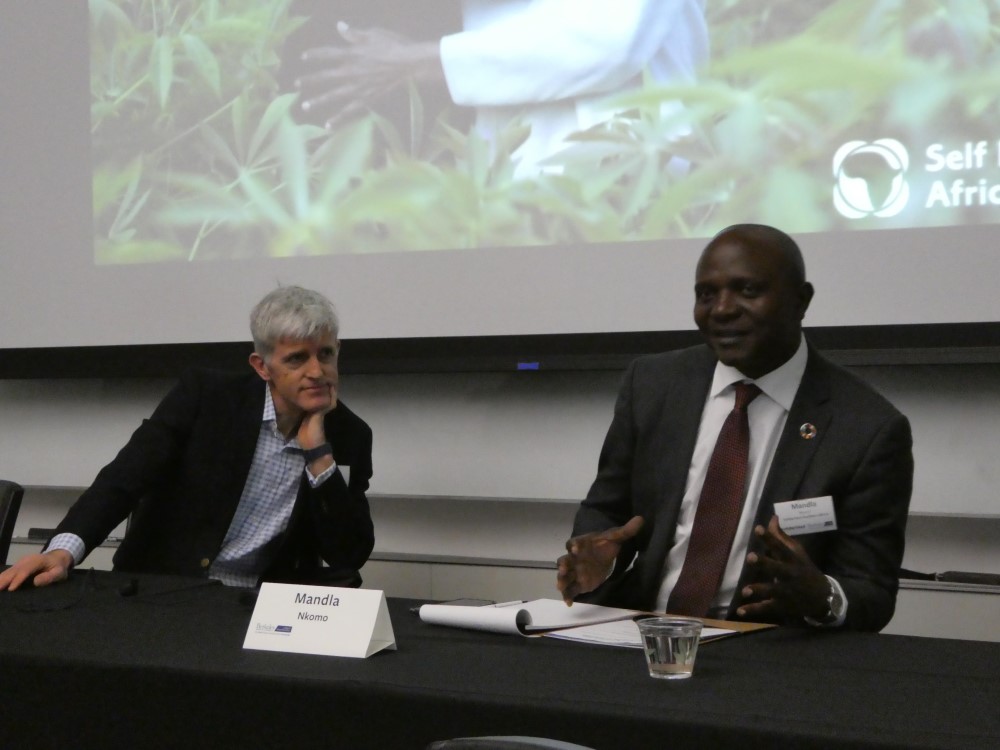
L-R: Will Galvin, Self Help Africa and Mandla Nkomo, Managing Director, Solidaridad Southern Africa in a panel discussion on Transition of Supply Chains in Emerging Markets
I recently attended the Innovation in Agrifood Supply Chains: Finance, Profitability, and Sustainability workshop, co-hosted by the College of Natural Resources at the University of California, Berkeley and Solidaridad North America. Held on 10 and 11 April, 2019, this two-day convening brought together researchers, scientists, food, ag-tech and finance industry representatives, food entrepreneurs, and development practitioners, like me. It was a dynamic mixture of leaders and practitioners in the space, representing diverse organizations including Netafim, Mars Inc., OCP Group, Bonaventure Capital, Revolution Foods, Guittard Chocolate, Golden Global Innovations, University of Guelph and University of California, Davis, among others. I appreciated the rich debates that these diverse perspectives fostered, and also that the agenda focused on both wealthy and emerging economies, which gave a stronger sense of the global landscape for agrifood value chains.
My primary objective was to discover new research findings and innovations that could benefit smallholder producers and bottom of the pyramid consumers around the world. In that vein, here are my top takeaways:
Food systems in Africa and Asia are in transition, and more focus is needed on local supply chains
Today 80% of food goes through an agrifood value chain, as opposed to being grown, processed and consumed on the family farm. This dramatic increase in one generation is driven largely by urbanization, but also a rise in purchased food in rural areas. There is a shift to consuming more processed foods, and a demand for diversification beyond traditional food grains, including more perishable foods. There has been a trend around the world towards the “supermarket revolution” where all food categories can be found in one store. These trends point to the need to invest in stronger local agrifood supply chains that meet evolving consumer demand. Strengthening local supply chains cannot be overlooked for the sake of investing in export supply chains, of products such as coffee or cocoa, which have high demand from wealthy countries.
(from talks by Thomas Reardon, Professor, Agricultural, Food, and Resource Economics, Michigan State University; Mandla Nkomo, Managing Director, Solidaridad Southern Africa)
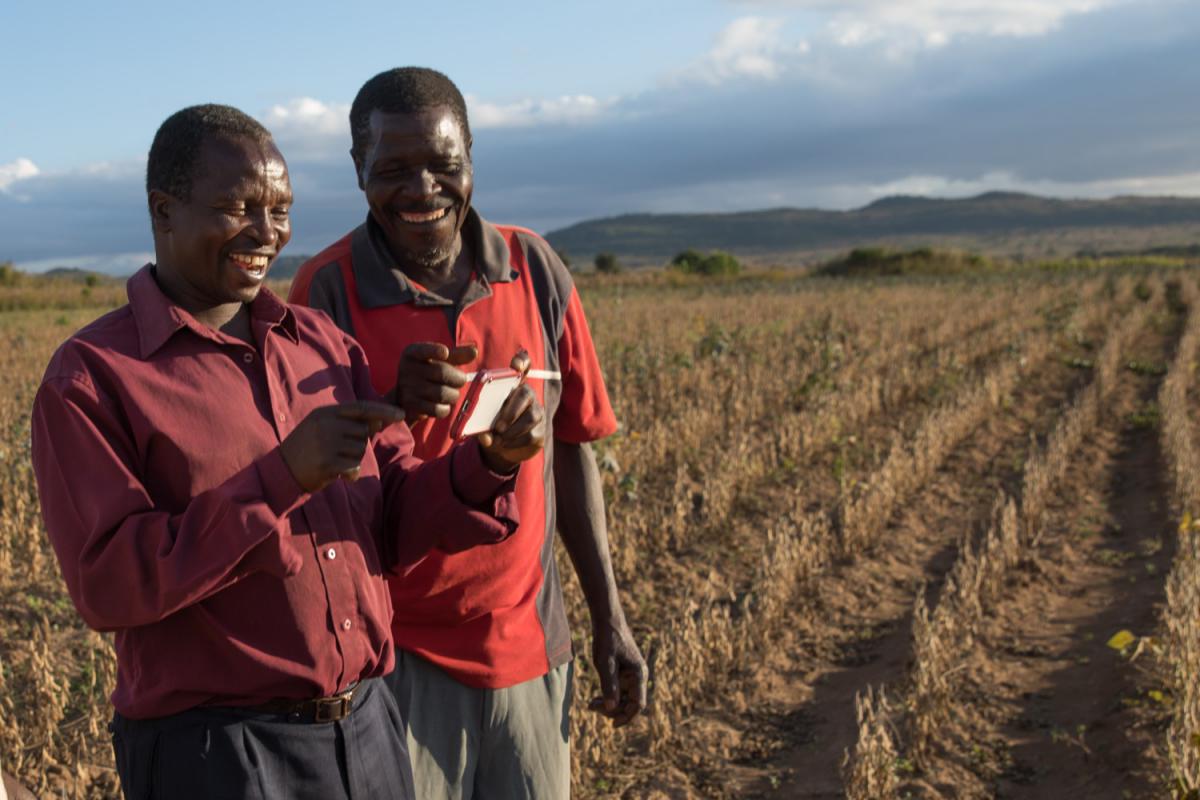
Smallholder farmers in Mozambique examining a digital farming tool on their mobile phones
Small farmers will benefit most if the focus is on designing strong food systems
Policy and public investment are often focused on the farmer – the farmer is often the most disadvantaged player in the supply chain, and the farmer often holds an important place in national and cultural identity. We know how to “help” the farmer to adopt best agronomic and business practices, in order to make incrementally more money within an existing system. Yet focusing only on the farmer overlooks the fact that 60% of the marketed value of food lies in the products developed after the harvest leaves the farm. There are decades of economic research that opine on profit maximization at the firm level; however, today’s challenge is to design a food system that provides profit for all actors; diverse, nutritious, affordable foods to more consumers; incentives that will foster innovation; and livable incomes for smallholder farming families, be it on or off the farm.
(from talks by David Zilberman, Professor & Robinson Chair, Agricultural and Resource Economics, UC Berkeley; and Thomas Reardon)
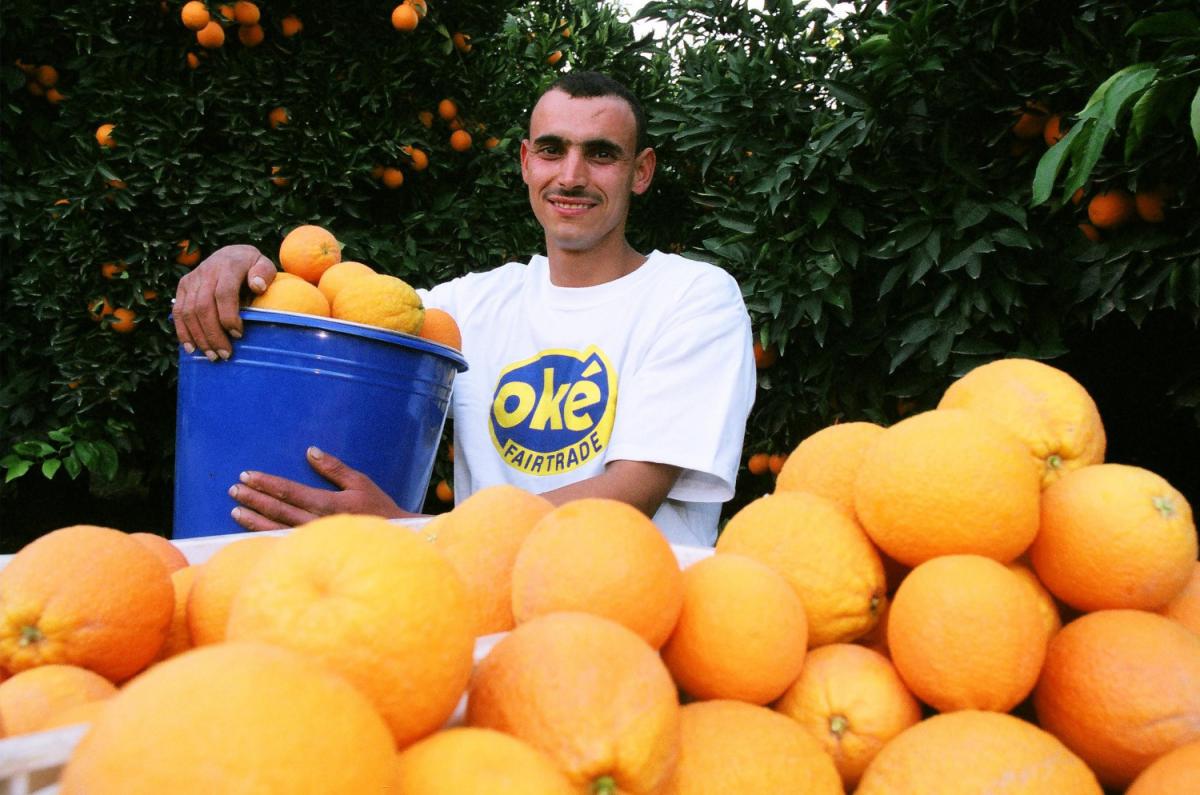
Picking and processing of Oke citrus in Morocco
60% of human food consumption comes from only four foods
This is a staggering statistic, especially given that there are more than 2,000 foods on earth. These four foods are sugarcane, wheat, maize and rice. This is a result of agriculture policy and the drive for economies of scale. Yet this lack of crop diversity creates problems: monoculture ultimately creates energy imbalances and leads to greater greenhouse gas emissions, and certainly doesn’t provide the balanced nutrition humans need. The increased demand for a wider variety of foods (how many of us were eating quinoa and persimmons in the US 10 years ago?) should not be limited to wealthier countries; policy and public investment should support diversifying food production around the world.
(from talk by Ramón Espinel, Director of the Institute for Rural Research, Polytechnic University of Guayaquil)
Presentation by Nina Ichikawa, Interim Executive Director, Berkeley Food Institute on the market for organic foods
The landscape for agrifood supply chain financing is promising with more investment and more financial instruments
Venture capital investment in agriculture saw a dramatic uptick in 2011 and has been increasing around the world ever since. Estimates of venture capital funding in agricultural ranged from $3-5B in 2018. New financial instruments supporting agriculture are growing as well: loan guarantees, performance loans, subordinate loans, convertible loans, loan syndications, impact bonds, impact equity, and loan syndications. An example of a new approach is the Advance Trade Growth Fund’s invoice discounting solution. On average, agricultural SMEs around the world wait 68 days for an invoice to be paid, which strains their working capital. In this scheme (essentially factoring) partner financial institutions accept the invoices as an asset, the financial institution makes the payment to the SME within two days minus a fee; and the buyer pays the invoice to the financial institution.
(from talks by Glenn Yago, Founder and Senior Fellow, Financial Innovations Labs; Sam Miller Hicks, Global Head of Impact, Advance Global Capital; and Gregory Graff, Associate Professor, Agricultural and Resource Economics, Colorado State University)
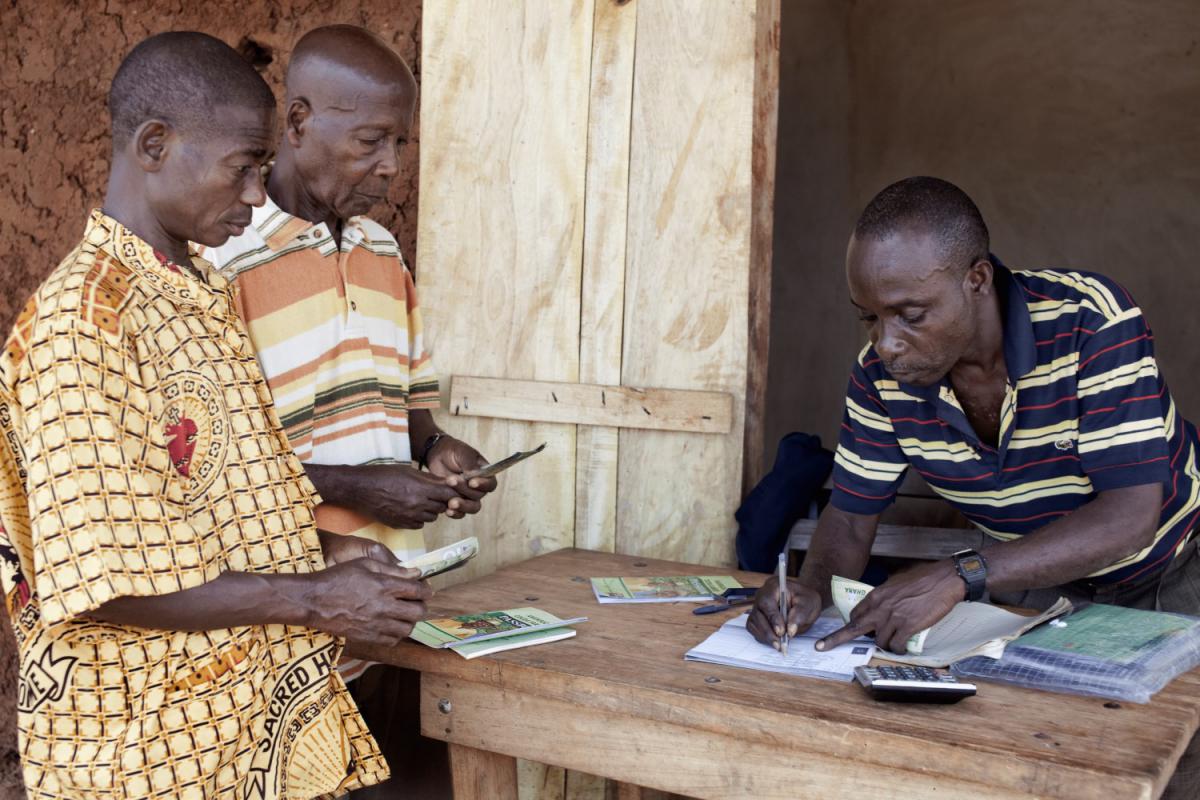
Smallholder cocoa farmers in Ghana getting paid for their produce
New technology won’t necessarily benefit small farmers unless it is designed to do so
Digitization, precision agriculture, blockchain, big data, and artificial intelligence are all technologies that could be game changers, but could also pass by small farmers if there is no intentional focus on them. Also, big data can produce large volumes of data in agriculture, but without the needed analysis and decision rules based on the data, the data is not useful to farmers. For instance, the benefit of blockchain technology all the way to the farmer is not clear, though the technology provides inc
reased traceability, which could influence consumer loyalty and ultimately benefit the farmer. However, there are examples that demonstrate the potential of technology to change the lives of small farmers. For example, Self Help Africa’s TruTrade product digitizes value chain transactions to the benefit of farmers, aggregators and buyers. This program has also enabled women to take on roles as intermediaries, now that payments are digital, which overcomes the safety concerns of carrying cash.
(from talks by Alfons Weersink, Professor, Food, Agricultural & Resource Economics, University of Guelph; Will Galvin, Executive Vice President, Self Help Africa; Randy Katz, Vice Chancellor for Research, University of California, Berkeley)
Presentation by Ze’ev Barylka, Director of Marketing, Netafim USA on innovation in farming technology
Genome editing creates massive opportunities in agriculture
The ability to edit specific genomes using CRISPR (Clustered Regularly Interspaced Short Palindromic Repeats) technology creates a tremendous opportunity to increase agricultural productivity and to make foods safer to eat. The editing of plants does not define them as genetically modified because no outside DNA is introduced. It works only with existing DNA and only addresses a specific trait. Examples of successful cases to date include the elimination of cyanogen in cassava which can produce poisonous cyanide; or modifying the stomatal formation in rice so that they better retain water and are, therefore, more drought resistant.
(from talks by Susan Jenkins, Managing Director, Innovative Genomics Institute; and Howard Yana-Shapiro, Chief Agricultural Officer, Mars, Inc.) 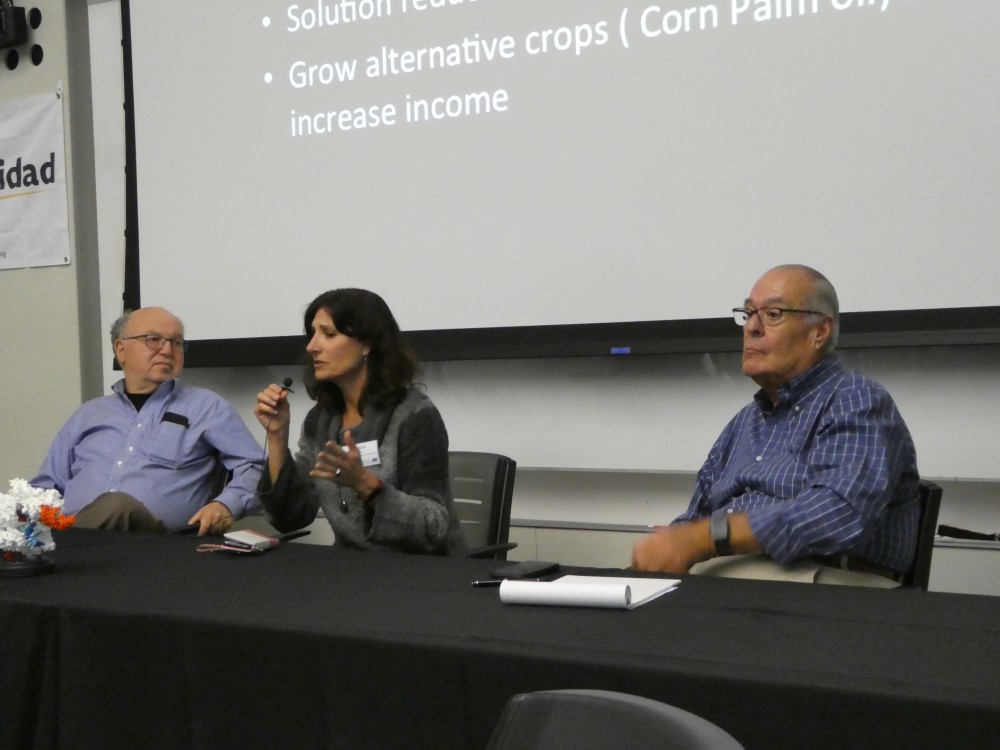
L-R: David Zilberman, Professor, UC Berkeley, Susan Jenkins, Managing Director, Innovative Genomics Institute and Ramon Espinel, Director of the Institute for Rural Research, Polytechnic University of Guayaquil in a panel discussion on Technology and Policy in Supply Chains
Don’t give your spider caffeine
And from left field: scientists at NASA conducted research on the effects of different drugs on spiders’ web-spinning capabilities. The findings were…unexpected (google it!). In a panel discussing innovative foods, Bianca de Jong and Natasha de Jong, Founders of Predator Endurance® drink made the case that their energy drink with super herbs is a much healthier alternative than caffeine-filled energy drinks, and used the spider research to make the point.

The Predator Endurance® drink presented by conference speakers and food entrepreneurs, Bianca and Natasha de Jong
Through lectures, and the rich discussions that followed each session, the conference made amply clear that the need for investment and innovation to nourish the world’s growing population and preserve the planet is immense. The outlook is nonetheless bright, with increasing investment, new ideas, evolving technology and a growing commitment to ensuring that these positive trends benefit all people around the world.
Krisila Benson leads her own consulting firm that supports social ventures with strategy, impact and scale. She has spent 20 years designing, leading, and advising social impact programs around the world, with organizations such as TechnoServe and PSI. Krisila holds an MBA from the University of California, Berkeley.
Learn more about sustainability initiatives from North America
